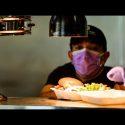COVID questions: Anxiety about the return to ‘normal’, other vaccines
Editor’s note: We will be publishing answers to questions about COVID-19 and the pandemic each week in this COVID questions column. If you have a question, please email it to covid19update@uc.wisc.edu.
Q: I have been fully vaccinated for more than a month but am still finding it difficult to return to “normal,” especially now that mask mandates and physical distancing regulations have lifted. Is there a safe way for us to begin socializing again?
A: Many people who are vaccinated are feeling a lot of anxiety about not wearing a mask out in the world. For over a year, we’ve been told that masks were the best way to protect against the virus, so it makes sense that there is some anticipatory anxiety around not wearing a mask. Also, people should be mindful that others may continue to feel more comfortable wearing masks in public settings, either because they have young children (11 and under) who are not yet vaccinated, are immunocompromised, or just want to use this extra safety precaution because we know it is effective in preventing illness. Regardless of your position, it is important to be nonjudgmental about people’s choices regarding mask wearing.
In a pre-lockdown world, many people experienced a “fear of missing out” (FOMO) on social events, but now many people are experiencing a “fear of going out” (FOGO). It will be important to start taking small steps to do activities that the CDC deems safe, even if they are anxiety producing. It is detrimental to avoid social situations in the long run because doing so impairs quality of life and engagement in life. Recognizing that others will be feeling uncomfortable, too, normalizes the awkwardness we might be experiencing.
With warmer weather upon us, take this time to recommit to a personal health goal. Exercise is a proven method for dealing with anxiety and depression. Reflecting on what you want your life and health to look like can be a strong motivator in helping people take healthy action steps toward a better future.
Things are getting better, but we are not out of the woods yet. We must continue to be diligent, especially knowing that large pockets of people in our communities are still not vaccinated. Keep hand washing, keep social distancing in public settings, and keep making your physical and mental health a priority.
Some people might need additional help to manage their anxiety or depression during this time; anybody who is feeling overwhelmed by their emotions should reach out to a behavioral health specialist.
– Shilagh Mirgain, UW Health psychologist, from UW Health news.
Q: Does the U.S. recognize vaccines that are not FDA-authorized but are being used in other countries, such as Sinopharm or Sinovac? If I received one of these vaccines, can I get the Pfizer, Moderna or J&J shot when travel to the U.S.?
A: The CDC has been making recommendations about this topic, and continue to update the guidelines regularly here.
Per the CDC, people who have received all recommended doses of a COVID-19 vaccine that is listed for emergency use by WHO do not need any additional doses with an FDA-authorized COVID-19 vaccine. However, in some circumstances people who received a COVID-19 vaccine not currently authorized in the United States may be offered revaccination with an FDA-authorized vaccine.
None of the vaccines are considered interchangeable, so individuals would start over with an available U.S. vaccine if they did not complete the series with a WHO-approved vaccine.
– James Conway, Pediatric Infectious Diseases Fellowship Program Director and School of Medicine and Public Health Office of Global Health Director
See more answers to COVID questions at https://news.wisc.edu/tag/covid-questions/. Also, visit our COVID-19 impact site.
Tags: COVID questions, covid-19



